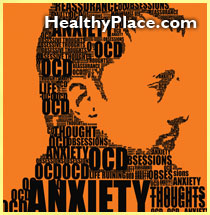OCD: Getting Control of Your Obsessions and Compulsions

![]()
Dr. Lee Baer talks about OCD symptoms and treating Obsessive Compulsive Disorder with OCD medications and cognitive behavioral therapy. Included in the discussion: coping with obsessions and compulsions, what to do about obsessive and intrusive thoughts (bad thoughts), defining and treating scrupulosity and OCPD (Obsessive-Compulsive Personality Disorder) and more.
David Roberts is the HealthyPlace.com moderator.
The people in blue are audience members.
David: Good Evening. I'm David Roberts. I'm the moderator for tonight's conference. I want to welcome everyone to HealthyPlace.com. Our topic tonight is "OCD: Getting Control of Your Obsessions and Compulsions." Our guest is author and OCD researcher, Lee Baer, Ph.D. Dr. Baer is an internationally known expert in the treatment of obsessive-compulsive disorder. He is an associate professor of psychology at Harvard Medical School and the director of research at the OCD unit at Massachusetts General Hospital as well as the OCD Institute at McLean Hospital.
Dr. Baer has written two excellent books on OCD:
- The Imp of the Mind: Exploring the Silent Epidemic of Obsessive Bad Thoughts
- Getting Control: Overcoming Your Obsessions and Compulsions
Before we get started, I also want to mention that we have an OCD screening test on our site. Please click the link and check it out.
Good evening, Dr. Baer and welcome to HealthyPlace.com. We appreciate you being our guest tonight. Is it possible to actually get control over your obsessions and compulsions? And, if so, how?
Dr. Baer: It is good to be here. Most of our patients do see much improvement in obsessions and compulsions, using either behavior therapy, medications or a combination.
David: Does it take both cognitive behavioral therapy and OCD medications to make a significant recovery or will one of those suffice?
Dr. Baer: For people who are very severely affected, both are usually needed. However, for milder or moderate cases, sufferers often do very well with cognitive behavioral therapy alone, if they are willing to work hard.
David: Maybe you could explain how cognitive behavioral therapy works and give us an example or two of using it with an OCD patient?
Dr. Baer: The simplest example is someone with contamination fears who washes their hands too much. The behavior therapy, in this case called exposure and response prevention, involves having him/her touch things he/she thinks are contaminated and would usually avoid, (this is the "exposure" part) and then resist urges to wash for as long as they can (this is the "response prevention" part). Over a few practice sessions, their fear and avoidance goes down. We modify this basic approach for other types of rituals (another name for compulsions) and obsessions.
David: It sounds very rational and easy -- the therapist teaches the patient his or her thoughts are irrational and the patient comes to understand that. But apparently, it isn't that simple or everyone could be easily cured.
Dr. Baer: I usually say that behavior therapy is simple, but not easy. Some people are not bothered enough by their symptoms to be willing to endure any anxiety during treatment. Also, as you know, most Americans would rather take medications and get better fast. Our colleagues in London notice this is less true of their patients, who usually would rather not take OCD medications but want to do behavior therapy instead.
Finally, when people have many different kinds of obsessions and compulsions mixed together it is more complicated to devise an effective treatment program. For example, when they have only obsessions in their head, but no observable compulsions.
David: Are there a great number of people with OCD who have that difficulty?
Dr. Baer: Yes, we think so. As a matter of fact, although the large majority of people who come to our clinics have both compulsions (physical actions they perform) and obsessions (bad thoughts or images), door-to-door surveys suggest that most people in the world with OCD have mainly obsessions. That is the reason I wrote my latest book, Imp of the Mind. I think that many people who have seen people on network TV shows washing their hands, or checking locks or light switches may not have identified their problem as Obsessive-Compulsive Disorder.
For example, a new mother with obsessions about harming her baby, or a man with sexual thoughts (homosexuality, incest) that he feels very guilty about. So these may really be the most common kinds of OCD.
David: And some of these obsessions can be deeply disturbing, like thinking you want to kill your baby or something similar. We talked a bit about controlling the compulsions using cognitive behavioral therapy. But how does one keep these deeply disturbing intrusive thoughts from entering into their minds?
Dr. Baer: A big part of the problem is that our natural first impulse is to try to push the thoughts away. Unfortunately, we now know this only makes them stronger. It is like telling yourself not to think about a pink elephant. The harder you try, the more you think about it.
So the first thing we teach is to let the thoughts pass through your mind, even if they are disturbing. We also teach that everyone has bad thoughts like these from time-to-time, the difference is that people with OCD dwell on them more and feel more guilty about them. Then we have the person expose herself to things she obsesses about. For example, if she is afraid of violent thoughts, we might have her watch a violent movie, if she usually avoids things like this. This is how we modify the usual exposure and response prevention for what I call "bad thoughts".
David: Why is it that some people are able to have these disturbing, intrusive thoughts and accept them as just a "passing thought" and others with OCD are extremely worried that the thoughts will translate into action?
Dr. Baer: One reason is that most people with OCD are very concerned with certainty. They want 100% assurance that they will never act on their thoughts. However, while people without Obsessive-Compulsive Disorder accept that there is never such a thing as absolute certainty, they can accept very low risks. Another thing I've noticed is that many of these OCD sufferers are, and have been since they were children, very concerned about what other people think about them. This may be why they almost always obsess about doing the most socially inappropriate thing they can think of.
David: One more question from me and then we'll start with some audience questions. Have scientists figured out what causes OCD?
Dr. Baer: Not completely. There are probably many different ways that OCD can develop. In a very few cases, children and adolescents develop OCD symptoms immediately after a strep infection (strep throat), which causes some swelling in specific parts of their brains. They then get better with antibiotic treatment. However, this is a tiny percentage of cases, we think. There seems to be at least some genetic component, as well. Finally, we have found recently that some people can develop OCD symptoms after some traumatic stressful situation.
David: Do most individuals then develop Obsessive Compulsive Disorder in their younger years vs. as an adult?
Dr. Baer: The most common age of onset is between about 18 and 22. It would be very unusual for OCD to first appear, say, in someone in their 50's or 60's. However, children as young as 3 or 4 can occasionally develop OCD, and we have seen some people in their 60's and 70's develop OCD when they become very depressed.
David: We have a lot of audience questions, Dr. Baer. Here's the first one:
happypill1: What if part of the sufferer's Obsessive Compulsive Disorder is not being able to go to therapy?
Dr. Baer: Of course it depends on how the OCD interferes - for example, if they are afraid of contamination outside the home, this would require one approach. If they can't get out of the house because of checking locks or retracing, this requires another. We have been developing computer self-help programs to try to help people who can't get to behavior therapists, with some encouraging results.
David: Can a person get good results from self-help or would you recommend that they seek professional treatment?
Dr. Baer: I recommend that they try self-help first. If it is going to be successful, they should see results within a couple of weeks. After my book Getting Control came out in 1991, it was nice to get letters from people in parts of the country without behavior therapists that they were able to get better with self-help. Of course, for more complicated cases, a professional is needed. And if medications are necessary, a psychiatrist is needed.
shelldawg: Hi. My name is Shelly and I have had OCD for about 3 years. I'm only 15 and my case is very unusual and has to do with self mutilation. How can I deal with that and why am I affected with OCD?
Dr. Baer: There are many problems that are related to OCD. Researchers call these "OCD spectrum" problems. For example, we see many people who pull out their hair, or pick at scabs or pimples on their skin. There are other people who feel urges to do things that are self-injurious. These are called impulsive behaviors, because they are not caused by fear or anxiety, but usually feel like an urge building up until they are done. We have other techniques, like "habit reversal", and "dialectical behavior therapy for these".
David: Is there hope for a significant recovery for someone like Shelly?
Dr. Baer: Many people learn how to control their impulses with the techniques I mentioned above, usually with the addition of a medication. So the short answer is, yes. I forgot to add that Shelly will need to see a professional to help her with her problems. In my experience, these do not respond well to self-help.
David: So Shelly, I hope you talk to your parents about getting some professional help and you can show them the transcript of this conference if they need more information.
flipper: I can't get rid of my intrusive thoughts. What do I do?
Dr. Baer: It is not possible to force them out of your head. The best approach is to let them pass through on their own. It would help if you could figure out what are the situations that trigger your intrusive thoughts, and then expose yourself to them. Also if, guilt is a major part of the problem with the intrusive thoughts, meeting other people with these thoughts, or talking to a compassionate clergyman can be very helpful. I've run a group for people with bad thoughts for 2 years, and the participants find it very helpful in reducing their guilt. If behavioral techniques don't help, the addition of SRI medications is often helpful.
JagerXXX: Doctor, is it a normal symptom to have these guilty thoughts and actually convince myself that I did them, even when I KNOW I didn't?
Dr. Baer: It absolutely is! Some people I've seen obsess about having caused an accident while driving, or having molested a child, and even though they get reassurance, they sometimes confess to having done these things, sometimes to the police!
scrumpy: I have, for many years, had fears about garbagemen, sanitary towels and any woman who has had a baby or anyone who is menstruating. I avoid all of these people. If I come into contact with them accidentally, then I feel disgusting and a lot more feelings too. I was leading a very good life until I went into a kitchen when I shared a house and there were soiled sanitary towels in the bin. Why is it that I, in one second, lost years of therapy and it took years before I made progress again?
Dr. Baer: It sounds like you have fears of contamination. The kinds of things that bother you are very common triggers. I have found that problems like yours often respond very well and very quickly to exposure therapy and response prevention. Also, feeling "disgust" is a very common experience,, instead of feeling anxiety in OCD. Some people feel "dirty", or "just not right" too. I don't know what kind of therapy you had in the past, so I can't comment on why the relapse - fortunately behavior therapy's results tend to last for many years after treatment.
David: Scrumpy brought up the fact that she had an OCD relapse after several years of doing well. Is that common?
Dr. Baer: An OCD relapse can be caused by several factors. Sometimes things like pregnancy can lead to relapse, or a major life stress like marriage or moving or changing jobs. Also, when people stop taking SRI medications that have helped control their OCD symptoms, about 50% notice a recurrence of symptoms in the months following.
David: Here's a description of Scrumpy's OCD symptoms, then we'll continue:
scrumpy: These are my biggest fears: I can't seem to get past this stage when I was told I was in the same room as someone who had just had a baby. I froze then I went all hot and cold in a matter of seconds. I found out the baby was 3 months old and the lady would not be menstruating anymore. I feel anxiety as well as fear. I had behavior therapy before when I relapsed.
David: Here's the next question:
PowerPuffGirl: Would the speaker please give some behavioral examples of mild vs. moderate vs. severe OCD?
Dr. Baer: We have a residential program at McLean hospital for people with severe OCD. Most of these people have not responded to many different medications. Often to behavior therapy as well. Some of these very severe OCD sufferers need help to even get into the bathroom, or out of bed, or out of the shower. Some are so affected they can't eat!
By the way, Moderate OCD is usually treated on an outpatient basis. These people are usually able to work, or go to school, but their day is interfered with by OCD symptoms. People with mild OCD rarely come to our clinics, but they can benefit from self-help OCD books.
David: Please post the phone number where people can find out more about the residential program.
Dr. Baer: If anyone has severe OCD, they can contact our residential program manager Diane Baney at 617-855-3279 for information.
David: To those in the audience, if you have found some effective method or way or coping with or relieving your OCD symptoms, please send them to me and I'll post them as we go along. That way others can benefit from your knowledge and experiences.
bedford: What should family members do so they are not enabling the OCD suffer? Any good books out regarding this? When is Imp of the Mind due out?
Dr. Baer: Easy question first - Imp of the Mind is out Jan 15th 2001, but amazon.com is taking orders now, and probably shipping now.
Dr. Gravitz has written a good book on families and OCD. I don't remember the title, but it came out a year or so ago. Most self-help OCD books, including my Getting Control, include one or more chapters for family members to read about how to try to help (often by not helping so much!)
scrumpy: Herbert L. Gravitz, book for families is called Obsessive Compulsive Disorder, New help for the family. I have it in front of me.
Nerak: Can you explain the difference between OCD & OCPD and how one treats OCPD (Obsessive-Compulsive Personality Disorder)?
Dr. Baer: OCPD is obsessive-compulsive personality disorder. It is really what we mean when we say that someone is "compulsive". These people are very detail oriented, they can be workaholics, they can insist that family members do things exactly the way they ask them to, they have also been traditionally described as "stingy" with emotions and with money, and they may have trouble throwing things away. Notice that they do not have the classic obsessions or compulsions of OCD. Honestly, there is not much research on treating OCPD because most of these people don't come to us for treatment - their symptoms may bother their family members, but usually not the person him/herself. However, when a person has BOTH OCD and OCPD, we often see the OCPD get better as the OCD gets better.
David: Here are a few audience tips for coping:
PowerPuffGirl: I've found that by addressing the cognitive/ emotional piece, specifically in terms of, for example, contamination fears, that clients have seen great success.
JagerXXX: I find that drinking and using substances can lead to terrible OCD episodes.
joshua123: Doctor, I have scrupulosity and I am trying to find help for the last 7 years. It is extreme and I have been on many meds. I need a specialist in the San Francisco bay area. Do you know how I could obtain this?
Dr. Baer: As far as behavior goes, Dr. Jacqueline Persons is an excellent behavior therapist, with offices I think in Oakland and SF. For medication, Dr. Lorrin Koran is very experienced with OCD and is at the Stanford medical school. Finally, if you happen to be covered by Kaiser Permanente, I recently participated in major training program for 90 of their therapists to learn how to treat OCD. They seemed very competent. Good luck.
David: And could you define scrupulosity for us, please?
Dr. Baer: Scrupulosity is usually associated with religious or moral guilt. Usually the person is worried about having committed a sin. The Catholic church has written about this for centuries, and their is even a religious organization called "Scrupulous Anonymous." I know they have a web site too.
EKeller103: Could Dr. Baer please discuss the connection between OCD and Ruminating?
Dr. Baer: Ruminating is worrying or thinking about something over and over again. Often it is about real life things, like not having enough money, or whether something will work out or not. Therefore, ruminating occurs in depression and in anxiety. Obsessions are a very specific kind of ruminating, about being dirty or contaminated, or about having made a mistake, or about things being out of order and not perfect, etc.
David: I want to touch on the area of medications. What are the most effective medications for OCD?
Dr. Baer: The antidepressant medications that are called SRI drugs. These all increase the serotonin available in the brain. They are Anafranil (Clomipramine), Prozac (Fluoxetine), Luvox (Fluvoxamine), Paxil (Paroxetine), Celexa (Citalopram Hydrobromide). There are other drugs that work too, but these are the first line treatments. I forgot to mention Zoloft.
poe: Hello, I'm Poe. I've just been diagnosed with OCD and depression. I was put on Clomipramine but it made me too sick. I have to wait until the 10th to get a different medication. The waiting is the worst part. What can I do in the meantime to keep from going more frustrated and incapacitated?
Dr. Baer: For the depression cognitive therapy can be very helpful. Dr. Burns's book Feeling Good is a classic. Of course, I'd also suggest you try some self-help for the Obsessive-Compulsive Disorder. This is especially important because all of these drugs can take up to 12 weeks to have any effect on OCD symptoms.
David: I think Shelly mentioned this earlier, but here's a similar comment from Poe:
poe: Lately, I've thought of self injury as a way to cope with the ocd and depression. How do I go about repressing these urges?
chilly: I take Paxil, which relieved the depression and Aderall and Paxil should relieve anxiety, yet my "need to control" through senseless OCD habits still persists. What can help?
Dr. Baer: It is important to distinguish suicidal thoughts and self-injury for this reason, from urges that seem to build up to do something to relieve the tension. Suicidal thoughts are caused by depression and hopelessness, while the urges to do impulsive acts to relieve tension are part of the OCD spectrum disorders.
David: Earlier, Dr. Baer mentioned that people with OCD sometimes start out by being highly critical of themselves. Here's a comment from Chilly along those same lines:
chilly: My self-injury began in trying to improve my looks, which I have obsessive thoughts about. This habit has done the exact opposite! It makes my looks worse, is defeating the purpose.
Dr. Baer: Another of the disorders that is part of the OCD spectrum is "body dysmorphic disorder" where the person thinks that some part of his or her appearance is ugly or somehow not right. We often see people who pick at their skin or other things to try to improve their appearance. For this disorder, I recommend Dr. Phillips book "The Broken Mirror".
Steve1: How much association does Obsessive-Compulsive Disorder have with Panic Disorder and if you have Panic Disorder what are the chances of you developing OCD?
Dr. Baer: There is some overlap between OCD and panic disorder, but much less than we would have expected. The vast majority of people with panic disorder will never develop OCD. I mentioned at the beginning that in a few cases of OCD, traumatic experiences may have triggered the symptoms, and we often see both panic and OCD symptoms co-existing in these cases.
dofraz: Please provide some therapy techniques for non-medicated children diagnosed with OCD. I need help with a 4 year old girl. We are looking for information. We have met with several doctors who have diagnosed her with OCD. My daughter will not count past 9 or say most people's names. We were working with a behaviorist with very little success.
Dr. Baer: At the risk of sounding like a bookstore, I would strongly recommend that you get Dr. John March's book(s) on behavioral treatment of children with OCD. He explains how, at Duke University, he modifies behavior therapy in terms kids can understand and gets excellent results, usually with no, or very little medication. The techniques are the same in treating kids as adults, but of course it has to be explained differently.
David: Here's an audience comment on how medications helped her:
MalibuBarbie1959: Luvox has helped my symptoms but Anafranil completely took it away.
Dr. Baer: These are the only two SRI drugs that are sometimes prescribed together. They often seem to complement each other when a single drug doesn't work.
astrid: Is an obsessive thought about suicide something that I should be concerned about or should I try to dismiss the thought along with my other obsessive thoughts?
Dr. Baer: If the thought is about wishing to be dead, or is part of feeling very depressed and hopeless, then it is NOT considered an obsessive thought and shouldn't be treated as one. Then it should be treated as a serious symptom of depression. But some people say that they don't wish to be dead, and are not depressed, but sometimes get images of harming themselves that get stuck in their heads. These could be obsessive thoughts. Of course, it is important to take any suicidal thoughts seriously and see a professional, and it will probably take a professional to tell these thoughts apart. I would therefore suggest talking to a professional before trying self-treatment for this symptom.
ict4evr2: I have suffered with Obsessive Compulsive Disorder for as long as I can remember. It has been a very secretive, private illness. However, others have obviously seen bizarre behavior. I have made a feeble attempt at drug therapy once. My question is do people with OCD develop other major problems later in life if OCD is not treated early?
Dr. Baer: Other disorders do not develop, and the OCD usually remains at about the same level if not treated; although, of course, more relationships and job situations are affected as people have OCD longer. But many people come to us in their 50's and 60's seeking treatment for the first time, and respond very quickly.
kimo23: Define Primary Obsessional Slowness, please and where information can be found on this type of OCD.
Dr. Baer: People with primary obsessional slowness do everything extremely slowly. They can get "stuck" in bathrooms for many hours at a time or in showers until all the hot water runs out. They usually describe not being able to start an action until it feels perfectly right. This problem does not respond to self-treatment and almost always requires medication in addition to behavior therapy. I talk about it in Getting Control
Slate: My husband has OCD. He is doing really well in terms of not acting out compulsions, as a result of some work with exposure and response prevention. But his obsessions often focus around flaws he sees in ME. For example, he recently told me that on our wedding day he was happy to be married, but he'd been distressed the whole day because he couldn't look at me without seeing a speck of dirt in my eye and he felt so horrible about thinking that when he was getting married.
David: I'm sure this is very tough to deal with. What suggestions would you have, Dr. Baer?
Dr. Baer: We are testing a new kind of treatment for OCD which is called cognitive therapy for OCD. It seems to be effective for the kinds of symptoms you describe about perfectionism. It involves having the person examine his thoughts for cognitive errors or distortions common in OCD. I included a chapter describing this technique in my book The Imp of the Mind along with a case illustration of this new technique.
David: I know it's getting late. Thank you, Dr. Baer, for being our guest tonight and for sharing this information with us. And to those in the audience, thank you for coming and participating. I hope you found it helpful. We have a very large and active community here at HealthyPlace.com. Also, if you found our site beneficial, I hope you'll pass our URL around to your friends, mail list buddies, and others. http://www.healthyplace.com.
Dr. Baer: The questions were excellent. I enjoyed participating.
David: Thanks again for coming, Dr. Baer. Good night, everyone.
Disclaimer: We are not recommending or endorsing any of the suggestions of our guest. In fact, we strongly encourage you to talk over any therapies, remedies or suggestions with your doctor BEFORE you implement them or make any changes in your treatment.
APA Reference
Gluck, S.
(2007, February 24). OCD: Getting Control of Your Obsessions and Compulsions, HealthyPlace. Retrieved
on 2025, April 18 from https://www.healthyplace.com/anxiety-panic/transcripts/ocd-getting-control-of-your-obsessions-and-compulsions









